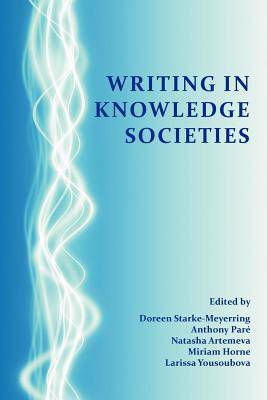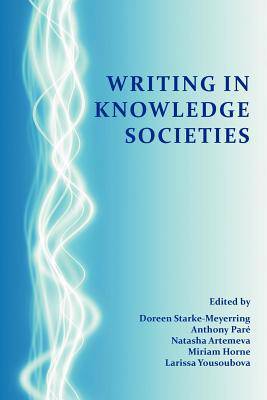
Je cadeautjes zeker op tijd in huis hebben voor de feestdagen? Kom langs in onze winkels en vind het perfecte geschenk!
- Afhalen na 1 uur in een winkel met voorraad
- Gratis thuislevering in België vanaf € 30
- Ruim aanbod met 7 miljoen producten
Je cadeautjes zeker op tijd in huis hebben voor de feestdagen? Kom langs in onze winkels en vind het perfecte geschenk!
- Afhalen na 1 uur in een winkel met voorraad
- Gratis thuislevering in België vanaf € 30
- Ruim aanbod met 7 miljoen producten
Zoeken
Omschrijving
The editors of WRITING IN KNOWLEDGE SOCIETIES provide a thoughtful, carefully constructed collection that addresses the vital roles rhetoric and writing play as knowledge-making practices in diverse knowledge-intensive settings. The essays in this book examine the multiple, subtle, yet consequential ways in which writing is epistemic, articulating the central role of writing in creating, shaping, sharing, and contesting knowledge in a range of human activities in workplaces, civic settings, and higher education. WRITING IN KNOWLEDGE SOCIETIES helps us conceptualize the ways in which rhetoric and writing work to organize, (re-)produce, undermine, dominate, marginalize, or contest knowledge-making practices in diverse settings, showing the many ways in which rhetoric and writing operate in knowledge-intensive organizations and societies. Essays are contributed by Natasha Artemeva, Chantal Barriault, Charles Bazerman, Doug Brent, Janet Giltrow, Amanda Goldrick-Jones, Jeffrey Grabill, Heather Graves, Roger Graves, William Hart-Davidson, Miriam Horne, Ken Hyland, Heekyeong Lee, Mary Maguire, Lynn McAlpine, Anthony Paré, Anne Parker, Margaret Procter, Martine Courant Rife, Paul Rogers, Catherine Schryer, Tania Smith, Philippa Spoel, Doreen Starke-Meyerring, Olivia Walling, Diana Wegner, and Larissa Yousoubova. DOREEN STARKE-MEYERRING is an associate professor in the Department of Integrated Studies in Education, McGill University, Montreal, Canada. ANTHONY PARÉ is a professor in the Department of Integrated Studies in Education, McGill University, Montreal, Canada. NATASHA ARTEMEVA is an associate professor in the School of Linguistics and Language Studies, Carleton University, Canada. MIRIAM HORNE is an assistant professor in the Core Division at Champlain College, Burlington, Vermont, USA. LARISSA YOUSOUBOVA is a doctoral candidate in the Department of Integrated Studies in Education, McGill University, Montreal, Canada.
Specificaties
Betrokkenen
- Uitgeverij:
Inhoud
- Aantal bladzijden:
- 452
- Taal:
- Engels
- Reeks:
Eigenschappen
- Productcode (EAN):
- 9781602352681
- Verschijningsdatum:
- 15/11/2011
- Uitvoering:
- Paperback
- Formaat:
- Trade paperback (VS)
- Afmetingen:
- 152 mm x 229 mm
- Gewicht:
- 657 g

Alleen bij Standaard Boekhandel
+ 121 punten op je klantenkaart van Standaard Boekhandel
Beoordelingen
We publiceren alleen reviews die voldoen aan de voorwaarden voor reviews. Bekijk onze voorwaarden voor reviews.








